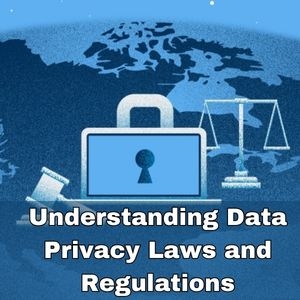Understanding Data Privacy Laws and RegulationsPosted by Archi Jain on September 22nd, 2023  IntroductionIn today's digital age, we constantly hear about data privacy and the importance of protecting our personal information. From social media platforms collecting our data to online retailers tracking our shopping behaviors, it's no wonder that data privacy has become a major concern for individuals and organizations alike. But what exactly is data privacy? And why is it so important? Let's dive in and explore these questions together. Data privacy refers to the protection of an individual's personal information from being accessed, used, or disclosed without their consent. This includes any data or information that can be used to identify a person, such as their name, address, social security number, or even their browsing history. In today's interconnected world where a significant amount of our daily activities take place online, ensuring the privacy of our personal information has become crucial. With the rise of data science and machine learning technologies, companies have access to vast amounts of data that can be analyzed and used for various purposes. While this can bring convenience and efficiency in many aspects of our lives, it also raises concerns about how our personal information is being used and protected. The concept of data privacy is not new. In fact, it has been around since the early days of computing when individuals first started using computers to store their personal information. However, with the rapid advancement of technology and the widespread use of the internet, data privacy has now become a global issue. Over the years, there have been various attempts to protect data privacy through laws and regulations. The first law specifically targeting this issue was enacted in Sweden in 1973 with the Data Protection Act. It aimed at regulating how personal data was collected, processed, and used by businesses. Understanding Data Privacy and Its SignificanceSo, what exactly is data privacy? In simple terms, it refers to the protection of personal information from being accessed, used, or shared without consent. This includes sensitive data such as your name, address, phone number, financial information, and more. With the increasing use of social media platforms and online services, our personal data is collected and stored by various organizations for different purposes. Data privacy ensures that this information remains secure and not misused. The importance of data privacy has significantly increased with the rise of cyber crimes such as identity theft and data breaches. These incidents not only cause monetary losses but also lead to a breach of trust between consumers and businesses. Moreover, with the advancements in technologies like artificial intelligence and machine learning, companies can now process vast amounts of data to gain insights about their consumer's behavior patterns. While this can be beneficial for businesses to improve their products or services, it also raises concerns about invading an individual's privacy. To address these issues and protect individuals' rights over their personal information, various laws and regulations have been established globally. The most prominent one being the General Data Protection Regulation (GDPR) implemented by the European Union in 2018. GDPR lays down strict guidelines for how companies can collect, store and use personal data while also giving individuals more control over their information. Evolution of Data Privacy Laws and RegulationsData privacy has become a hot topic in recent years, with the increasing use of technology in our daily lives. From online shopping to social media, we are constantly sharing our personal information online without giving it much thought. However, with advancements in data science and machine learning, there has been a growing concern about the protection of personal information. The evolution of data privacy laws and regulations has been driven by these technological advancements. Let's take a journey through time to understand how these laws have evolved. In the 1970s, the first data privacy laws were enacted to protect sensitive financial information. This was in response to the increasing use of credit cards and the need to secure financial transactions. The Fair Credit Reporting Act (FCRA) was introduced in 1974, which regulated the collection, dissemination, and use of consumer credit information. As technology continued to advance, so did the need for more comprehensive data privacy laws. In 1986, the Electronic Communications Privacy Act (ECPA) was passed to protect electronic communications like email and instant messaging. This was followed by the Computer Fraud and Abuse Act (CFAA), which made it illegal for unauthorized individuals to access computer systems. With the growth of the internet in the 1990s came new challenges for data privacy. The Personal Information Protection and Electronic Documents Act (PIPEDA) was introduced in Canada in 2000 to ensure that businesses handle personal information responsibly. In Europe, the Data Protection Directive was established in 1995 to regulate how organizations use personal data. Key Components of Data Privacy Laws and Regulations Subsection: Personal Data Protection Subsection: Consent Requirements Subsection: Right to Access, Correction, and Deletion Subsection: Cross-Border Data Transfer RestrictionsAs the field of data science and machine learning continues to grow, so does the importance of protecting personal information. In today's increasingly digital world, it is crucial to understand the key components of data privacy laws and regulations in order to ensure the secure handling of personal data. Let's dive into the four main aspects that make up these laws: personal data protection, consent requirements, right to access, correction, and deletion, and cross border data transfer restrictions. Firstly, data privacy laws and regulations are put in place to protect individuals' personal information from unauthorized access. This includes any identifying information such as name, address, social security number, or financial information. With cyber threats on the rise, organizations must have measures in place to safeguard this sensitive data. This not only protects individuals' privacy but also builds trust between customers and companies. In order for companies to collect and use personal data lawfully, they must obtain consent from individuals. This means clearly stating what type of data will be collected and for what purpose it will be used for. Additionally, companies must provide individuals with the option to opt out or revoke their consent at any time. This ensures that individuals have control over their own personal information. Another key component of data privacy laws is granting individuals the right to access their own personal information and request corrections or deletions if necessary. This allows individuals to have a better understanding of how their information is being used by organizations and gives them the ability to correct any inaccuracies or delete unnecessary data. Not only does this give individuals more control over their data but also holds organizations accountable for their handling of personal information. Impact of Technology Advancements on Data Privacy Laws Subsection: Big Data Analytics and Machine Learning Subsection: Artificial Intelligence Subsection: Internet of Things (IoT)With the rise of data science and machine learning, companies are now able to store and analyze vast amounts of data from multiple sources. This has led to the emergence of big data analytics, which uses advanced algorithms to identify patterns and trends within large datasets. The insights gained from these analyses can provide businesses with a competitive edge, but at what cost? One major concern surrounding big data analytics is the potential invasion of privacy. With the ability to collect and analyze personal information such as browsing history, location data, and social media activity, individuals may feel like their online activities are being monitored without their consent. This is where data privacy laws come into play. In order to protect individuals' sensitive information from being misused or mishandled, governments around the world have implemented strict regulations on how companies must handle personal data. These laws are constantly evolving to keep up with new technological advancements and address any potential loopholes that may arise. Ensuring proper handling and protection of personal data is imperative not only for ethical reasons but also for legal compliance. Companies found violating data privacy laws can face hefty fines and damage to their reputation. As such, it is essential for organizations to prioritize implementing robust security measures and following guidelines set forth by regulatory bodies. You can also read:simplilearn data science course reviews Like it? Share it!More by this author |


